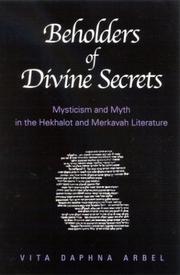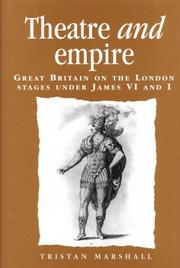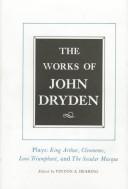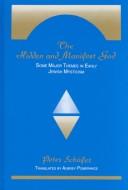| Listing 1 - 10 of 10 |
Sort by
|
Book
ISBN: 9789004136021 9004136029 9789004279209 9004279202 1322127751 9781322127750 Year: 2014 Volume: 90 Publisher: Leiden
Abstract | Keywords | Export | Availability | Bookmark
 Loading...
Loading...Choose an application
- Reference Manager
- EndNote
- RefWorks (Direct export to RefWorks)
This is a new and revised edition of the book first published 1980. It contains new introductory and concluding chapters as well as a Bibliography and updated Index. Furthermore, substantial corrections, updates, and changes have been made in the original text. The changes concern matters of language and style, they nuance the line of argumentation, and they update the discussion of major issues. The new chapters fill several scholarly gaps that have opened since the initial publication of this book in 1980. The new Introductory Chapter explores new venues and issues in the study and assessment of the Hekhalot literature and relevant passages in apocalyptic literature, and this in light of epistemological and ontological considerations. The Concluding Chapter discusses the ritual praxis of the experience of the Hekhalot mystics and its affitnity to magic, and this in terms of new approaches to ritual theory.
Throne of God. --- 296*64 --- God --- Merkava --- Joods messianisme en apocalyptiek --- Throne --- 296*64 Joods messianisme en apocalyptiek --- Throne of God --- Mysticism --- Apocalyptic literature. --- Literature, Apocalyptic --- Literature --- Judaism.
Book
ISBN: 9004059598 9004332677 0585334145 9780585334141 9789004332676 9789004059597 Year: 1980 Volume: Bd. 14 Publisher: Leiden E.J. Brill
Abstract | Keywords | Export | Availability | Bookmark
 Loading...
Loading...Choose an application
- Reference Manager
- EndNote
- RefWorks (Direct export to RefWorks)
Mysticism --- Apocalyptic literature --- Throne of God --- Judaism --- 296*64 --- -Apocalyptic literature --- God --- Merkava --- Literature, Apocalyptic --- Literature --- 296*64 Joods messianisme en apocalyptiek --- Joods messianisme en apocalyptiek --- Dark night of the soul --- Mystical theology --- Theology, Mystical --- Spiritual life --- Negative theology --- Throne --- Apocalyptic literature. --- Throne of God. --- Judaism.

ISBN: 0791486850 1417537418 9781417537419 0791457230 9780791457238 0791457249 9780791457245 9780791486856 Year: 2003 Publisher: Albany, N.Y. : State University of New York Press,
Abstract | Keywords | Export | Availability | Bookmark
 Loading...
Loading...Choose an application
- Reference Manager
- EndNote
- RefWorks (Direct export to RefWorks)
Beholders of Divine Secrets provides a fascinating exploration of the enigmatic Hekhalot and Merkavah literature, the Jewish mystical writings of late antiquity. Vita Daphna Arbel delves into the unique nature of the mystical teachings, experiences, revelations, and spiritual exegesis presented in this literature. While previous scholarship has demonstrated the connection between Hekhalot and Merkavah mysticism and parallel traditions in Rabbinical writings, the Dead Sea Scrolls, apocalyptic, early Christian, and Gnostic sources, this work points out additional mythological traditions that resonate in this literature. Arbel suggests that mythological patterns of expression, as well as themes and models rooted in Near Eastern mythological traditions are employed, in a spiritualized fashion, to communicate mystical content. The possible cultural and social context of the Hekhalot and Merkavah mysticism and its composers is discussed.
Jewish mythology. --- Merkava. --- Hekhalot literature --- Mysticism --- Hebrew mythology --- Mythology, Hebrew --- Mythology, Jewish --- Mythology --- Maʻaśeh merkavah (Jewish mysticism) --- Merkabah --- Merkavah --- Throne of God --- Heikhalot literature --- Cabala --- History and criticism. --- Judaism. --- Judaism --- Jewish mythology --- Merkava --- 296*4 --- 296*4 Joodse mystiek --- Joodse mystiek --- History and criticism
Book
ISBN: 1282069756 9786612069758 0226145271 9780226145273 9780226145259 0226145255 Year: 2008 Publisher: Chicago University of Chicago Press
Abstract | Keywords | Export | Availability | Bookmark
 Loading...
Loading...Choose an application
- Reference Manager
- EndNote
- RefWorks (Direct export to RefWorks)
Replete with shady merchants, scoundrels, hungry mercenaries, scheming nobles, and maneuvering cardinals, The Man Who Believed He Was King of France proves the adage that truth is often stranger than fiction-or at least as entertaining. The setting of this improbable but beguiling tale is 1354 and the Hundred Years' War being waged for control of France. Seeing an opportunity for political and material gain, the demagogic dictator of Rome tells Giannino di Guccio that he is in fact the lost heir to Louis X, allegedly switched at birth with the son of a Tuscan merchant. Once convinced of his birthright, Giannino claims for himself the name Jean I, king of France, and sets out on a brave-if ultimately ruinous-quest that leads him across Europe to prove his identity. With the skill of a crime scene detective, Tommaso di Carpegna Falconieri digs up evidence in the historical record to follow the story of a life so incredible that it was long considered a literary invention of the Italian Renaissance. From Italy to Hungry, then through Germany and France, the would-be king's unique combination of guile and earnestness seems to command the aid of lords and soldiers, the indulgence of inn-keepers and merchants, and the collusion of priests and rogues along the way. The apparent absurdity of the tale allows Carpegna Falconieri to analyze late-medieval society, exploring questions of essence and appearance, being and belief, at a time when the divine right of kings confronted the rise of mercantile culture. Giannino's life represents a moment in which truth, lies, history, and memory combine to make us wonder where reality leaves off and fiction begins.
Impostors and imposture --- Charlatans --- Imposters --- Pretenders --- Crime --- Criminals --- Europe --- Kings and rulers. --- History --- italian renaissance, history, giannino di guccio, louis x, lost heir, pretender to the throne, monarchy, royalty, cardinal, hundred years war, france, politics, biography, territory, rome, dictator, switched at birth, merchant, birthright, king, identity, quest, italy, hungary, germany, mercantile culture, divine right, belief, essence, appearance, being, imposture, impostors, capetian line, genealogy, nonfiction.
Book
ISBN: 0875866891 9780875866895 9780875866871 0875866875 9780875866888 0875866883 Year: 2009 Publisher: New York Algora Pub.
Abstract | Keywords | Export | Availability | Bookmark
 Loading...
Loading...Choose an application
- Reference Manager
- EndNote
- RefWorks (Direct export to RefWorks)
Incomparable villains and heroes surge through the history of medieval Russia. Ivan IV may have been dubbed the Terrible, but when he died, the Rurik dynasty that had ruled Russia for centuries came to an end. And what followed was far worse. This volume is the history of Russia's struggle through a period of weak rulers, false pretendants to the throne, foreign invasions and civil strife. Even the weather was disastrous, and famine was inevitable. War, butchery and betrayals ensued until the Romanov Dynasty took control. This is an original translation from classic Russian sources.
Pretenders to the throne --- Royal pretenders --- Kings and rulers --- Succession --- Boris Fyodorovich Godunov, --- Boris Fedorovich, --- Boris Fedorovich Godunov, --- Boris Godounov, --- Boris Godunof, --- Boris Godunov, --- Boris Godunow, --- Borys Godunow, --- Godounov, Boris, --- Godunof, Boris, --- Godunov, Boris Fedorovich, --- Godunow, Boris, --- Godunow, Borys, --- Борис Федорович Годунов, --- Russia --- Soviet Union --- History

ISBN: 152613473X 9781526134738 0719057485 9780719057489 1526134748 Year: 2000 Publisher: Manchester, UK New York New York Manchester University Press Distributed exclusively in the USA by St. Martin's Press
Abstract | Keywords | Export | Availability | Bookmark
 Loading...
Loading...Choose an application
- Reference Manager
- EndNote
- RefWorks (Direct export to RefWorks)
Theatre and empire looks at the genesis of British national identity in the reign of King James VI and I. While devolution is currently decentralising Britain, this book examines how the idea of a united kingdom was created in the first place. It does this by studying two things: the political language of the King's project to replace England, Scotland and Wales with a single kingdom of Great Britain; and cultural representations of empire on the public and private stages. The book argues that between 1603 and 1625 a group of playwrights celebrated a new national consciousness in works as diverse as Middleton's Hengist, King of Kent, Rowley's The Birth of Merlin and Shakespeare's Cymbeline. Specifically Jacobean interdisciplinary studies are few compared with Elizabethan and Caroline works, but the book attempts to redress the balance by offering a fresh appraisal of James Stuart's reign. Looking at both established and little-known plays and playwrights, Theatre and empire rewrites our understanding of the political and cultural context of the Jacobean stage.
Colonies in literature. --- Imperialism in literature. --- Nationalism in literature. --- Political plays, English --- Theater --- Politics and literature --- English drama --- History and criticism. --- History --- Great Britain --- In literature. --- Historiography. --- Empire. --- England. --- English throne. --- Great Britain. --- Jacobean empire. --- Jacobean. --- King James VI. --- King James. --- London stages. --- Middleton. --- Rowley. --- Scotland. --- Shakespeare. --- Theatre. --- drama. --- dramatic material. --- early modern history. --- foreign policy. --- plays. --- political culture. --- public opinion. --- stage. --- theatre companies.

ISBN: 0191789941 1282382934 9786612382932 0520905288 9780520905283 0520021258 9780520021259 Year: 1978 Publisher: Berkeley University of California Press
Abstract | Keywords | Export | Availability | Bookmark
 Loading...
Loading...Choose an application
- Reference Manager
- EndNote
- RefWorks (Direct export to RefWorks)
Volume XI contains three of Dryden's Plays, along with accompanying scholarly appartus: The Conquest of Granada, Marriage A-la-Mode, and The Assignation.
English drama. --- LITERARY CRITICISM / European / English, Irish, Scottish, Welsh. --- English literature --- Dryden, John, --- Dryden, John --- Drāydan, Jawn, --- Dryden, --- Author of Absalom & Achitophel, --- Author of Absalom and Achitophel, --- Absalom & Achitophel, Author of, --- Drydon, John, --- Bays, --- Bayes, --- Person of quality, --- D-n, --- Driden, John, --- Drajden, Džon, --- Драјден, Џон, --- 17th century. --- anti catholic. --- british literature. --- catholicism. --- classics. --- conquest. --- convent. --- crossed love. --- drama. --- farce. --- granada. --- heroic drama. --- heroism. --- incest. --- invasion. --- islam. --- jealousy. --- libertine. --- literary criticism. --- love at first sight. --- lovers. --- marriage. --- moors. --- muhammad xii. --- nun. --- play. --- politics. --- prince. --- princess. --- rake. --- religion. --- restoration comedy. --- restoration drama. --- restoration england. --- rightful heir. --- royal court. --- satire. --- seduction. --- sex. --- theater. --- throne. --- tragedy. --- usurper.
Book
ISBN: 0191789917 1282355139 9786612355134 0520904842 9780520904842 Year: 1965 Publisher: Berkeley University of California Press
Abstract | Keywords | Export | Availability | Bookmark
 Loading...
Loading...Choose an application
- Reference Manager
- EndNote
- RefWorks (Direct export to RefWorks)
Volume VIII contains three of Dryden's Plays, along with accompanying scholarly appartus: Wild Gallant, Rival Ladies, and Indian Queen.
English drama --- English drama (Comedy) --- Dryden, John, --- Criticism and interpretation. --- Dryden, John --- Drāydan, Jawn, --- Dryden, --- Author of Absalom & Achitophel, --- Author of Absalom and Achitophel, --- Absalom & Achitophel, Author of, --- Drydon, John, --- Bays, --- Bayes, --- Person of quality, --- D-n, --- Driden, John, --- Drajden, Džon, --- Драјден, Џон, --- aristocracy. --- arranged marriage. --- british literature. --- classic. --- courtship. --- cross dressing. --- drama. --- dramatic verse. --- family feud. --- fate. --- incest. --- indies. --- latin america. --- libertine. --- love triangle. --- love. --- lovers. --- marriage. --- mexico. --- mistaken identity. --- montezuma. --- passion. --- peru. --- play. --- political rivalry. --- prophet. --- rake. --- restoration comedy. --- ribald. --- rightful heir. --- romance. --- royalty. --- seduction. --- sex. --- sexual comedy. --- shipwreck. --- succession. --- suicide. --- theater. --- throne. --- tragicomedy. --- usurper.

ISBN: 1438418825 0585075271 9780585075273 9780791410431 0791410439 9780791410448 0791410447 0791410439 0791410447 9781438418827 Year: 1992 Publisher: Albany : State University of New York Press,
Abstract | Keywords | Export | Availability | Bookmark
 Loading...
Loading...Choose an application
- Reference Manager
- EndNote
- RefWorks (Direct export to RefWorks)
Merkava. --- Mysticism --- Maʻaśeh merkavah (Jewish mysticism) --- Merkabah --- Merkavah --- Throne of God --- Judaism --- History. --- Hebrew book of Enoch. --- Shiʻur komah. --- Heikhalot zutrati. --- Heikhalot rabbati. --- Hekhalot zuṭrati --- Hekhalot zutarti --- Hekhalot rabati --- Sefer Hekhalot rabati --- Sefer Pirḳe Hekhalot --- Pirḳe Hekhalot --- Third Enoch (Apocryphal book) --- Book of Enoch, Hebrew --- Bible. --- Enoch, Hebrew book of --- Heikhalot --- Sefer Heikhalot --- Hebrew Enoch --- Third book of Enoch --- 3 Enoch (Apocryphal book) --- Sefer Hekhalot --- Hekhalot --- 3rd Enoch (Apocryphal book) --- 3rd book of Enoch --- Shiʻur qomah --- Sefer ha-ḳomah --- Mysticism - Judaism - History. --- Shiur komah.
Book
ISSN: 01698125 ISBN: 9789004178793 9004178791 9789047441144 9047441141 1282950762 9781282950764 9786612950766 Year: 2009 Volume: 23 Publisher: Leiden Boston Brill
Abstract | Keywords | Export | Availability | Bookmark
 Loading...
Loading...Choose an application
- Reference Manager
- EndNote
- RefWorks (Direct export to RefWorks)
This volume is a study of two of the most important Slavonic apocalypses, the Apocalypse of Abraham and 2 Enoch, as crucial conceptual links between the symbolic universes of Second Temple apocalypticism and early Jewish mysticism. The study seeks to understand the mediating role of these Slavonic pseudepigraphical texts in the development of Jewish angelological and theophanic traditions from Second Temple apocalypticism to later Jewish Merkabah mysticism attested in the Hekhalot and Shiʿur Qomah materials. The study shows that mediatorial traditions of the principal angels and the exalted patriarchs and prophets played an important role in facilitating the transition from apocalypticism to early Jewish mysticism.
Apocryphal books (Old Testament) --- Mysticism --- Merkava. --- Translations into Church Slavic --- History and criticism. --- Judaism. --- Apocalypse of Abraham --- Slavonic book of Enoch --- Criticism, interpretation, etc. --- -Mysticism --- -229*210 --- 229*224 --- 229*224 Apocalypse van Abraham --- Apocalypse van Abraham --- 229*210 II Henoch (Slavische Henoch) --- II Henoch (Slavische Henoch) --- Dark night of the soul --- Mystical theology --- Theology, Mystical --- Spiritual life --- Negative theology --- Old Testament apocryphal books --- Pseudepigraphal books (Old Testament) --- Translations into Slavic --- -History and criticism. --- 2 Enoch (Apocryphal book) --- Second Enoch (Apocryphal book) --- Book of Enoch, --- Book of the secrets of Enoch (Apocryphal book) --- Secrets of Enoch, Book of the --- Slavonic Enoch, Book of the --- Bible. --- 2nd Enoch (Apocryphal book) --- Slavisches Henochbuch (Apocryphal book) --- Slawisches Henochbuch (Apocryphal book) --- Slavonic apocalypse of Enoch (Apocryphal book) --- Livre des secrets d'Hénoch (Apocryphal book) --- Knigy otkrovlenii︠a︡ Avrami︠e︡ --- Abraham, Apocalypse of --- Merkava --- 229*210 --- Maʻaśeh merkavah (Jewish mysticism) --- Merkabah --- Merkavah --- Throne of God --- Translations into Church Slavic&delete& --- History and criticism --- Judaism --- Apocryphal books (Old Testament) - Translations into Church Slavic - History and criticism. --- Mysticism - Judaism.
| Listing 1 - 10 of 10 |
Sort by
|

 Search
Search Feedback
Feedback About UniCat
About UniCat  Help
Help News
News